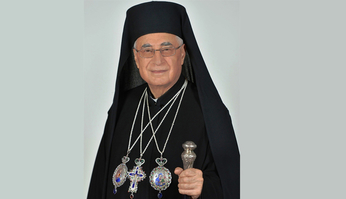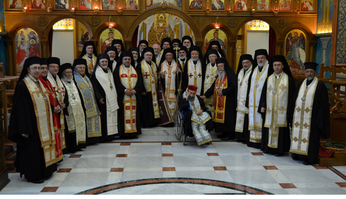Patriarch Youssef
Speech of H.B. Gregorios III Melkite Greek Catholic Patriarch of Antioch and All the East, of Alexandria and of Jerusalem, to the Holy Synod of the Ukrainian Greek Catholic Church (5 September 2016)
5 9 2016
Speech of H.B. Gregorios III
Melkite Greek Catholic
Patriarch of Antioch and All the East,
of Alexandria and of Jerusalem,
to the Holy Synod of the Ukrainian Greek Catholic Church
(5 September 2016)
Melkite Greek Catholic
Patriarch of Antioch and All the East,
of Alexandria and of Jerusalem,
to the Holy Synod of the Ukrainian Greek Catholic Church
(5 September 2016)
My brotherly greeting is addressed first of all to His Beatitude Sviatoslav, father and head of the illustrious Ukrainian Greek Catholic Church and worthy successor to the Servant of God, Andrey Sheptytsky, heroic Cardinal Yosyf Slipyj, Cardinal Myroslav Ivan Lubachivsky (who in Rome gave me the cross of his twenty-fifth anniversary of priestly ordination, and was hailed as patriarch in the Cathedral of Lviv on his triumphant return to the Ukraine) and of His most Eminent Beatitude my dear friend, venerable Cardinal Lubomyr Huzar, who accompanies you in constant prayer and courageous bearing of illness.
To your Holy Synod I bring greetings from your Melkite Greek Catholic sister-Church in Damascus, spiritual home of the Holy Apostle Paul, and from Syria, cradle of Christianity, in the name of our Holy Synod and faithful dwelling in the Patriarchates of Antioch, Alexandria and Jerusalem, the countries of the Middle East (Lebanon, Syria, Palestine, Iraq, Jordan, Egypt and other Arab countries), and (as is the case with you) the diaspora on every continent.
For the last five and a half years our country, Syria, has been walking the way of the cross. All our Syrian citizens are experiencing this: Churches, patriarchs, hierarchs, priests, monks, nuns and lay-persons of all denominations are supporting one another and bearing this heavy cross together.
The theme of this session of your Holy Synod is diakonia: serving one another, being in fellowship, practising mercy in this Jubilee Year of Mercy!
The life of our patriarchal Church is permanent diakonia. Our constant concern is to ensure that our diakonia is adequate to cope with the scale of the terrible tragedy of our people. We are all deacons, servants. We are knocking on every door in order to obtain assistance, to cope with urgent day-to-day necessities. A dramatic example of this is the catastrophic situation in Aleppo, the second Syrian city after Damascus.
More than ever, our Churches are living the experience of the early Church’s diakonia.
About one hundred and fifty churches have been destroyed or seriously damaged. Thousands of homes have been ruined. Around five hundred thousand of our faithful have had to flee their houses and villages. We are undergoing a real tsunami of emigration, which is decimating our communities.
These migrants are fleeing terrorism, savagery and the barbarity of so-called Islamic State. They are going to Lebanon, Turkey, Jordan, and then trying to reach Germany, Sweden and other European countries, Canada, the United States and Australia.
Despite all these calamities, life continues in Damascus and elsewhere, outside the combat zones. The streets of Damascus’ popular districts are full until evening. Outside the classroom, children play in the courtyards and alleys, as though they could not hear the artillery explosions and aerial bombardments on the capital’s outskirts. Power cuts are increasingly frequent. Shells fired by pockets of rebels around Damascus fall inside the city, killing and injuring people; initially very numerous, they have fortunately become rarer since the end of February, 2016.
Our pastoral work is carried on as far as possible. Our churches are full, especially during Lent and the Fast of the Dormition of the Mother of God.
We are rebuilding our churches, catechetical centres and the homes of our faithful that have been destroyed by war.
However, poverty is becoming more common even among those still living at home. The economic situation is very precarious and price increases are staggering, with continual devaluation of the Syrian currency. Beggary, which no longer existed before the crisis, has reappeared on the streets of the capital.
The Church has to face all these tragic conditions. The serving Church, as Pope Francis has said, must touch people’s wounds.
We cannot keep our eyes shut. As Scripture says, “If one member of the body suffers, all the other members suffer with it.” (1 Corinthians 12: 26)
Inter-Church relations are excellent. In Damascus, there are three of us patriarchs: the Greek Orthodox, the Syriac Orthodox and I, the Greek Catholic. Among us, relations are brotherly and ecumenism in Syria is in good health, as it is everywhere else in the Middle East.
We have various levels of encounter and co-operation, the highestbeing the Middle East Council of Churches and the Council of Eastern Catholic Patriarchs. There are other instances at national level. I am President of the Assembly of Catholic Hierarchs in Syria. There are also more or less regular meetings of bishops of different denominations in the same city.
The Churches in Syria and theirCatholic (three of whom live in Lebanon) and Orthodoxpatriarchs, share a very close and harmonious outlook on the Syrian crisis and war.
We exercise an ecumenical diakonia, as we share the same outlook on the current wars in the Middle East (following the so-called “Arab Spring”), emigration, and the Christian role and presence in a predominantly Muslim society.
Here, I touch on an important topic: the Church’s diakonia in relations with Islam.
On this theme, I have published two letters, one on Christians’ role in the crisis in Syria and the Arab world, and the other Message of an Arab Christian patriarch to his Muslim brethren in the Arab world, on the occasion of the fiftieth anniversary of the Declaration of the Second Vatican Council’s Nostra Ætate.
I summarise this relationship between Christians and Muslims in this threefold slogan:
We Christians and Muslims should remain together, to offer our young people a better future;
We Christians and Muslimscan remain together;
We Christians and Muslimswant to remain together.
This synodal visit is a grace for both our Churches. It presents an opportunity for us to think about intensifying our sobornost, our ecclesial communion. In this regard, allow me to make the following proposals, which echo the Special Assembly of the Synod of Bishops for the Church in the Middle East on Communion and Witness[1]:
- Set up an agency of regular, continuous communication between our two Churches, which are the two most numerous Greek Catholic Churches.
- Work together to create an “Assembly of Greek Catholic Churches,” which could be very useful for our Churches’ development, in the context of our communion with Rome.
- I founded a Major Seminary in the Holy Land, at Beit Sahur, near Bethlehem, with twenty-five rooms. It is currently empty because I am unable to send Arab seminarians there. I could place it at your Church’s disposal.
- Work together to convene an Extraordinary Synod of all Greek Catholic Churches to intensify the role of our Churches in communion with Rome, in terms of our mutual relations and our relations with Rome, the Orthodox Churches, and liturgically.
- Form a committee of Eastern theologians and Latin theologians familiar with the Eastern tradition. This committee would aim to clarify the role of the Eastern Catholic Churches of Byzantine Greek tradition, especially ecclesiologically[2], and their relations with Rome in the context of our full communion with the Church that “presides in charity.”
I entrust these proposals to your hearts and to the protection of our Lady, the Most Holy Mother of God and Ever-Virgin Mary.
In our reflection on the topic of the Church’s diakonia in society, we are inspired by the words of Pope Saint John Paul II in his last Message for the World Day of Peace (2005), when he said, that, “[Human] social nature...is... being `with´ and `for others.´[3]” Similarly, His Holiness Pope Francis on the Sixth Asian Youth Day said, “That is where encounter, dialogue, will take place. With identity, with openness.[4]”
That inspires our diakonia and our presence and role as Christians in the Middle East, in order to realise a celebrated dictum of Metropolitan Neophytos Edelby about our Melkite Greek Catholic Church:
We are Arab, but not Muslim!
We are Easterners, but not Orthodox!
We are Catholic, but not Latin!
This definition sums up the identity of our Melkite Greek Catholic Church, its role and mission towards Muslims, Orthodox and Latins, and our work for peace in the Middle East.
I should like to recall here the words of His Holiness Pope Francis in Amman, during the Jordanian stage of his pilgrimage to the Holy Land, (24 May 2014) on the two keys to peace in the Middle East and the world, that “a peaceful solution be found to the crisis in Syria, as well as a just solution to the Israeli-Palestinian conflict.[5]”
The very wise words of Pope Saint John PaulII and Pope Francis help us to fulfil what our Lord Jesus Christ said about us being light, salt and leaven in the lump.
For the welfare of the Holy Churches of God and for the union of all, together let us pray!
Let us pray for peace in your country and in our Middle East!
+ Gregorios III
Patriarch of Antioch and All the East,
Of Alexandria and of Jerusalem
[1]Benedict XVI, Post-Synodal Apostolic Exhortation Ecclesia in Medio Oriente, 28 and 32.
[2]See my article “Ecclesiology between East and West” published in 1993, when I was Archbishop Lutfi Laham, Patriarchal Vicar in Jerusalem, and which has been translated into Ukrainian.
[3]https://w2.vatican.va/content/john-paul-ii/en/messages/peace/documents/hf_jp- ii_mes_20041216_xxxviii-world-day-for-peace.html

